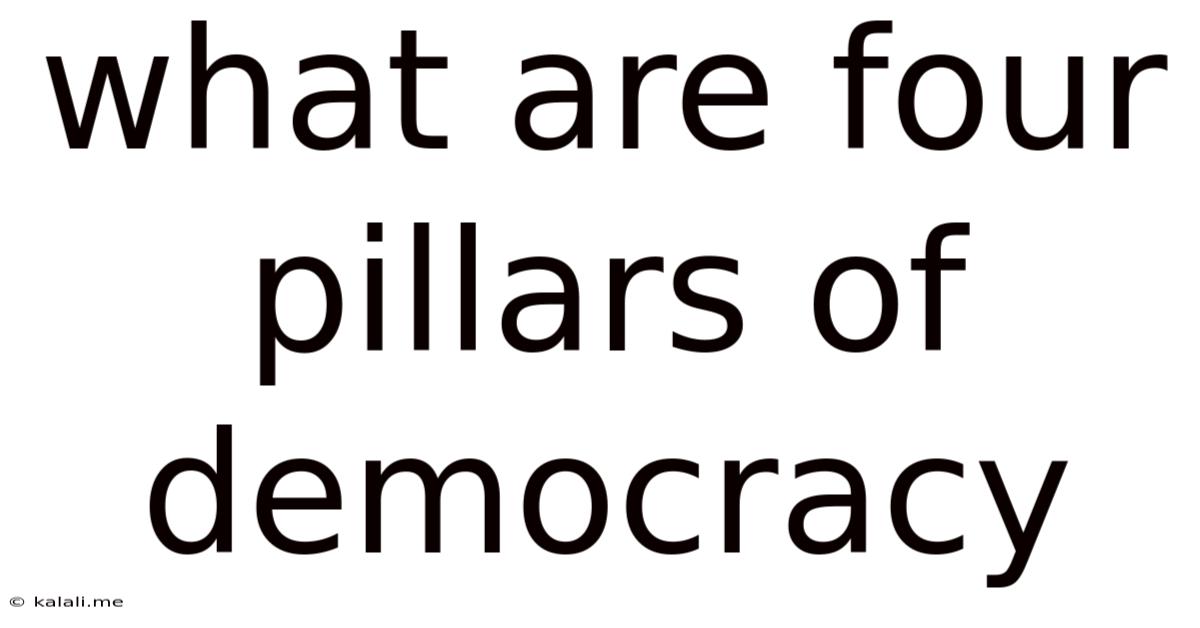What Are Four Pillars Of Democracy
Kalali
Jun 11, 2025 · 4 min read

Table of Contents
What Are the Four Pillars of Democracy? Understanding the Cornerstones of a Free Society
Democracy, often idealized as the government "of the people, by the people, for the people," rests upon several fundamental principles. While the exact number and terminology may vary depending on the political scientist or scholar, four pillars consistently emerge as crucial for a thriving and functional democracy: fair elections, protection of human rights, rule of law, and independent judiciary. This article delves into each pillar, exploring their significance and interconnectedness. Understanding these cornerstones is vital for citizens to actively participate in and safeguard their democratic systems.
1. Fair Elections: The Foundation of Democratic Legitimacy
Free and fair elections are the bedrock of any democracy. They ensure that the government is accountable to the people and reflects the will of the majority. Key characteristics of fair elections include:
- Universal suffrage: Every eligible citizen, regardless of race, gender, religion, or socioeconomic status, has the right to vote.
- Secret ballot: Individuals cast their votes privately, without coercion or intimidation, protecting their freedom of choice.
- Independent electoral commission: A neutral body oversees the electoral process, guaranteeing its fairness and transparency. This includes voter registration, ballot counting, and dispute resolution.
- Free and competitive campaigns: Political parties and candidates have equal opportunities to campaign and present their platforms to the electorate. Restrictions on free speech and media access must be minimal and justified.
- Transparent and verifiable results: The counting and announcement of election results are conducted openly and verifiably, allowing for public scrutiny and minimizing the potential for manipulation.
2. Protection of Human Rights: Upholding Individual Liberties
A vibrant democracy hinges on the respect and protection of fundamental human rights. These rights, often enshrined in constitutions and international treaties, safeguard individual freedoms and prevent government overreach. Crucial human rights include:
- Freedom of speech and expression: The right to express one's opinions and beliefs freely, including criticism of the government.
- Freedom of assembly and association: The right to gather peacefully and form organizations without government interference.
- Freedom of religion: The right to practice one's religion without discrimination or persecution.
- Due process and fair trial: The right to a fair and impartial legal process if accused of a crime.
- Protection against discrimination: The right to equal treatment under the law, regardless of background.
3. Rule of Law: Ensuring Accountability and Predictability
The rule of law is the principle that everyone, including the government, is subject to and accountable under the law. This prevents arbitrary power and ensures predictability in society. Key aspects include:
- Equality before the law: No one is above the law, regardless of their position or power.
- Fair and impartial application of the law: Laws are applied consistently and without bias.
- Independent judiciary: The courts are independent of the executive and legislative branches, ensuring impartial adjudication of legal disputes.
- Transparency and accessibility of legal processes: Legal proceedings are open to public scrutiny and easily accessible to all.
- Accountability for violations of the law: Those who violate the law are held accountable through established legal processes.
4. Independent Judiciary: The Guardian of Justice and Rights
An independent judiciary acts as a vital check on the power of the government and protects the rights of citizens. This independence is crucial to uphold the rule of law and ensure fair and impartial justice. Essential features include:
- Judicial independence from political influence: Judges are free from political pressure and can make decisions based on the law.
- Security of tenure for judges: Judges serve for a fixed term and cannot be easily dismissed, protecting them from political retribution.
- Impartiality and fairness in judicial decisions: Judges must be impartial and base their decisions on the evidence presented.
- Effective mechanisms for judicial review: Courts have the power to review government actions to ensure they are consistent with the law.
- Access to justice for all: All citizens have equal access to the courts and legal representation.
These four pillars—fair elections, protection of human rights, rule of law, and an independent judiciary—are deeply interconnected. Weakening one pillar inevitably weakens the others, undermining the overall health and stability of the democratic system. Active citizen participation, a vigilant media, and a strong civil society are crucial in ensuring these pillars remain strong and support a flourishing democracy.
Latest Posts
Latest Posts
-
How Many 750 Ml In A Gallon
Jul 01, 2025
-
How Long Is 90 Days In Months
Jul 01, 2025
-
How To Write 2 4 Billion In Numbers
Jul 01, 2025
-
I Want To Go Where The Thunder Dont Roar Lyrics
Jul 01, 2025
-
How Many Minutes Are In 900 Seconds
Jul 01, 2025
Related Post
Thank you for visiting our website which covers about What Are Four Pillars Of Democracy . We hope the information provided has been useful to you. Feel free to contact us if you have any questions or need further assistance. See you next time and don't miss to bookmark.